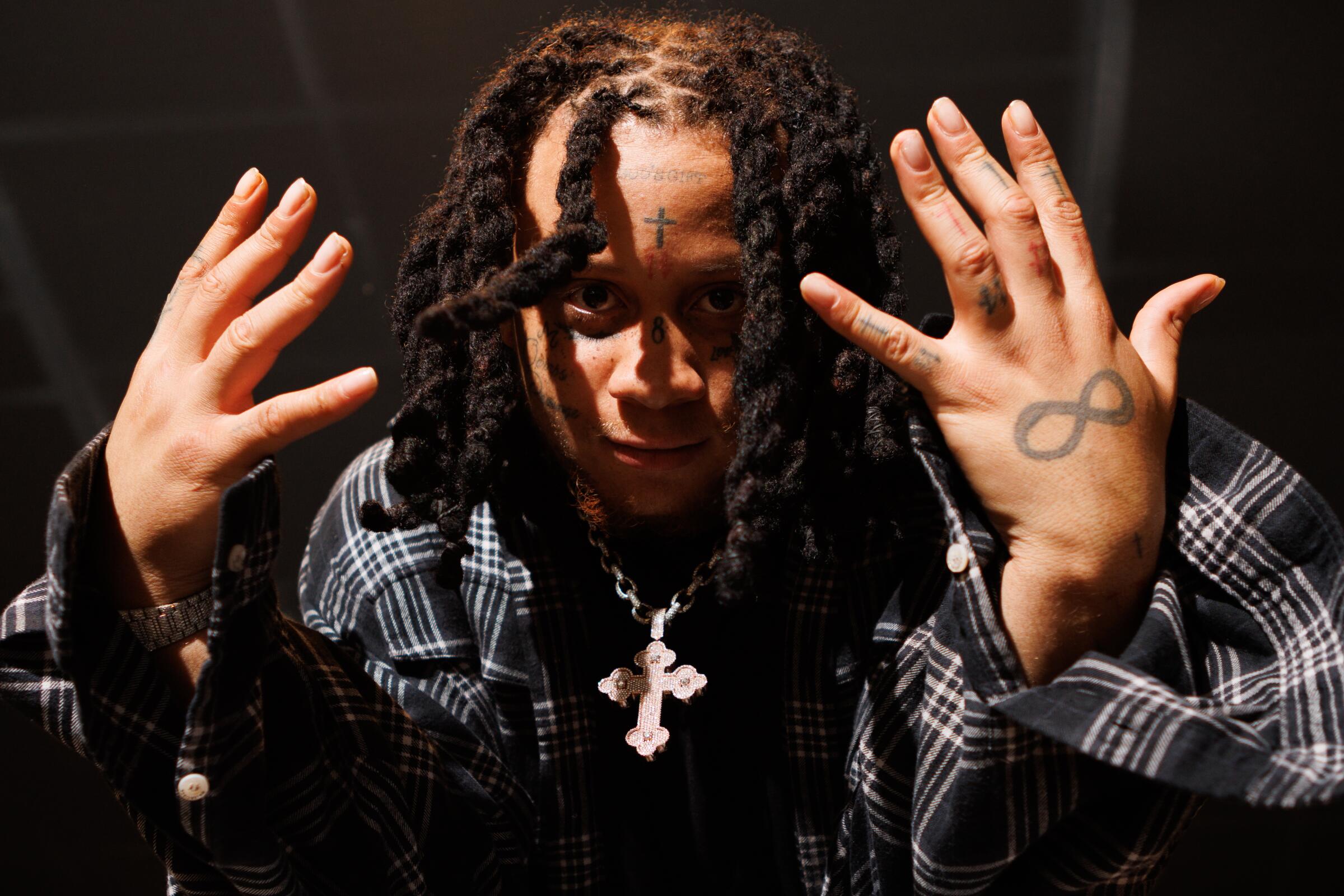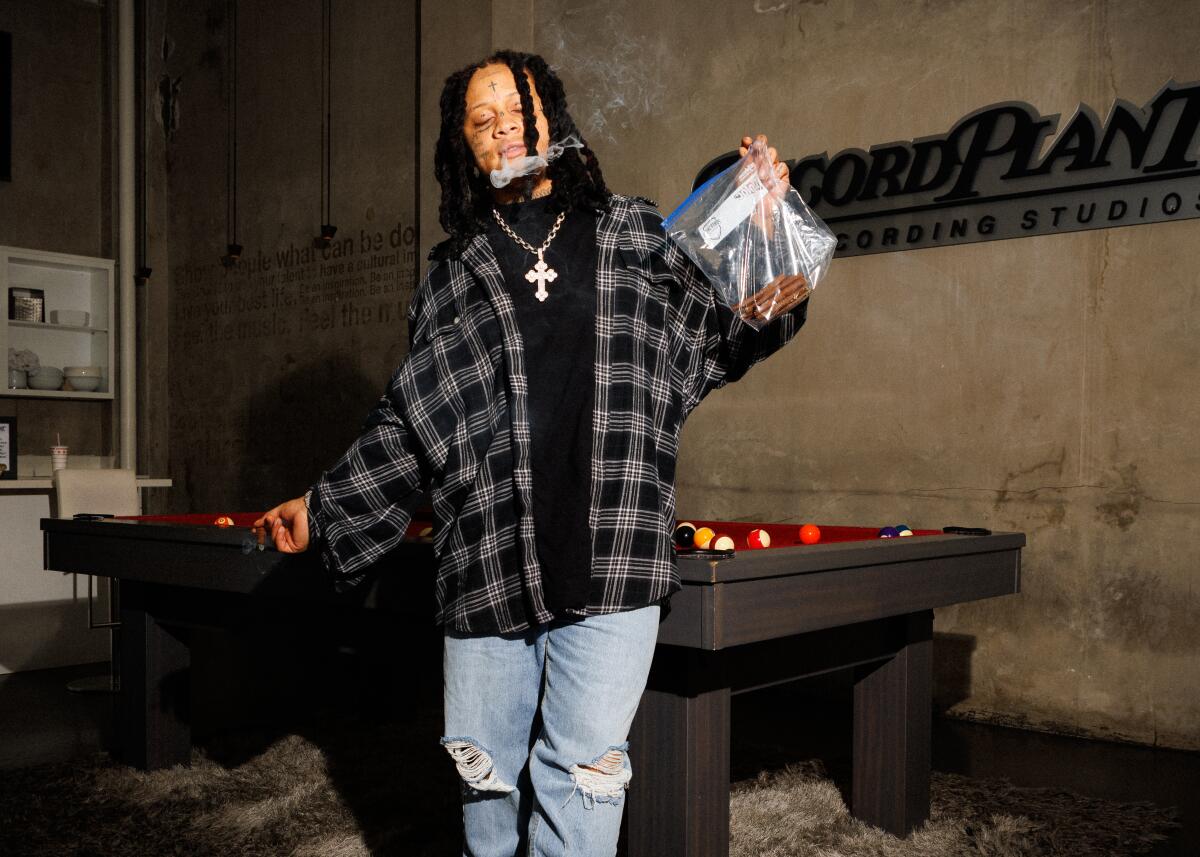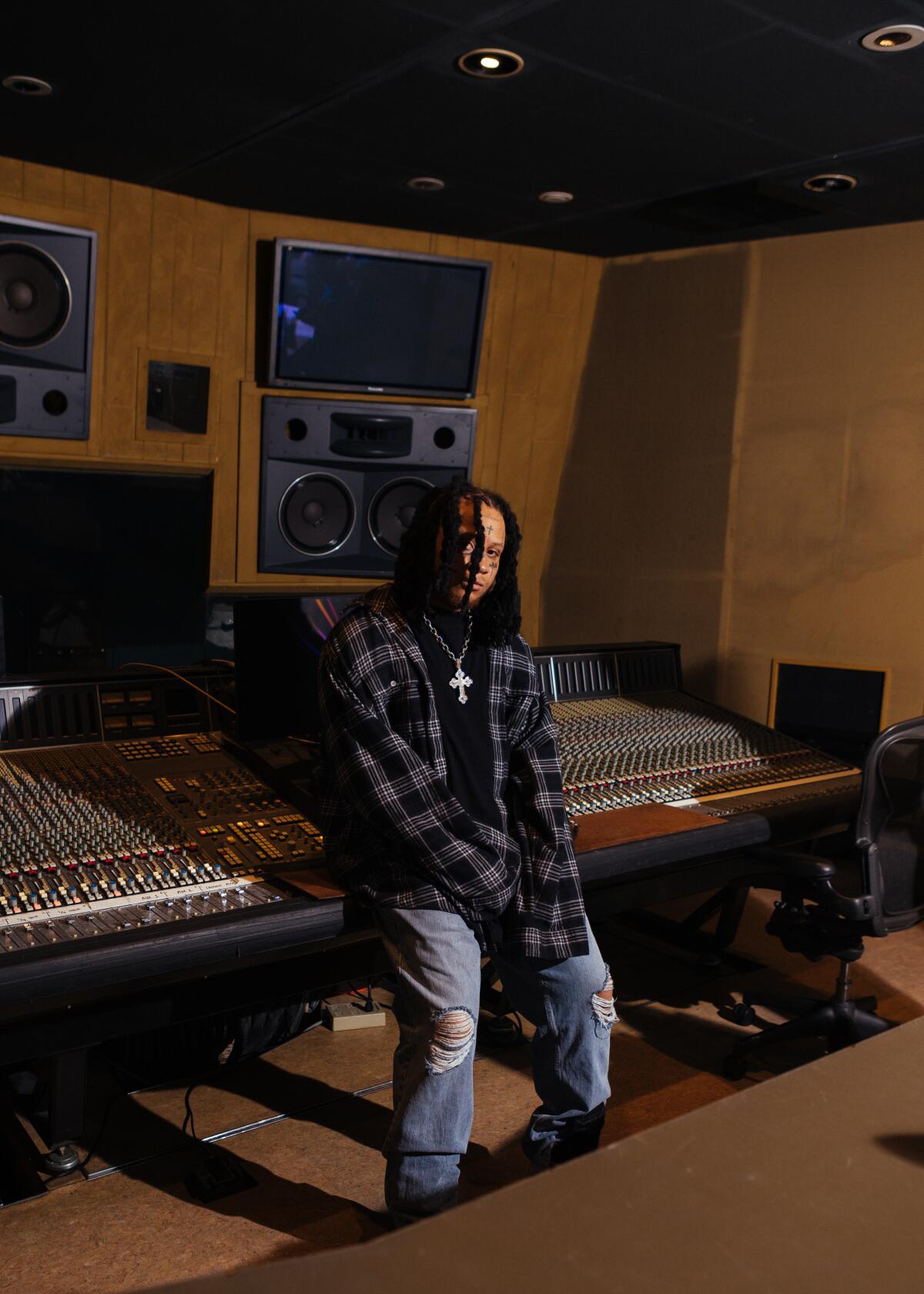The biggest entertainment stories
Get our big stories about Hollywood, film, television, music, arts, culture and more right in your inbox as soon as they publish.
You may occasionally receive promotional content from the Los Angeles Times.

In early fall, Trippie Redd shuffled down the hallway of the Record Plant, the Hollywood studio where pop stars from Rihanna to Selena Gomez have cut albums. Standing over a pool table near the kitchen, he jabbed the stick at the cue ball, which harmlessly skittered off to the side without disturbing the rack.
He managed better on a second attempt — solids and stripes clacked about the table, although nothing landed in a pocket — but after his third try was another dud, he tossed the stick with a shrug.
“I did something,” he conceded.
His natural habitat is down the hall to the right, inside the studio where he’s recorded some of his most popular songs, including “6Kiss” and “Topanga.” The room is an upgrade from Redd’s home-studio setup in Canton, Ohio, back when he was a burgeoning name on SoundCloud beginning to garner buzz for his 2016 song “Love Scars.” At that time, the platform was at an inflection point, teeming with artists who relished the opportunity to upload music directly to their listeners, bypassing labels and distributors.
Aided by Instagram, which made it seamless for artists and fans to connect online, a rabid underground community formed. Much of that community flowed around the edges of rap, emo, punk and trap. Anxiousness often permeated the lyrics, sometimes expressed over languid guitars, other times screamed over rattling 808s.

The sometimes abrasive, sometimes melancholy music fueled the growth of several new outlets still influential today, from the “No Jumper” podcast to Cole Bennett’s Lyrical Lemonade multimedia company to the Rolling Loud music festival (Redd is set to perform at the festival’s L.A. stop next month). But it also helped define SoundCloud to the public; three of the platform’s five most streamed songs are by artists who pillared the movement, including XXXTentacion’s “F— Love,” which features Redd and is No. 2, with 303 million plays.
“Those artists who they called SoundCloud rappers, if you look back at the winners of that school today, they have nothing to do with SoundCloud,” said Elliot Grainge, who signed Redd to his label, 10K Projects. “I don’t think [the SoundCloud rap label] affected Trippie at the time. He was one of the godfathers of that movement.”
Hip-hop had established itself on SoundCloud long before 2016 — Chance the Rapper, Travis Scott and Mac Miller built formidable audiences in the early 2010s. But by 2020, the platform’s influence had waned, with some of its most magnetic stars — Lil Peep, Juice Wrld and XXXTentacion — having lost their lives to drugs or violence, and its bigger names — Lil Uzi Vert, Playboi Carti and 21 Savage — picked off by major labels.
Redd is one of the most significant artists who stuck the landing after the dust had settled, his frenzied hit “Miss the Rage” peaking at No. 11 on the Billboard Hot 100 in 2021. Although he’s only 23, there’s a heaviness about him, most palpable when his fallen contemporaries are mentioned. “We had great times,” he said of his bond with XXXTentacion and Juice Wrld. “A lot of times when I was around X and Juice, we didn’t even do music. Just laugh and talk, like being with friends.”
Covered in black from his hoodie to his nail polish — occasionally semi-obscured by the plumes of smoke he blows while talking — he’s sunk into a dark couch at the Record Plant, one week removed from the release of his latest album, “Mansion Musik.” The project takes its name (but not quite its spelling) from Chief Keef’s 2018 mixtape “Mansion Musick”; Redd remembers being infatuated with the album’s cover, featuring a marble bust of the trailblazing Chicago rapper’s head at the base of an imperial staircase.

The Brooklyn rapper brought down the house during the Grammy Awards’ 50th anniversary of hip-hop celebration.
Redd’s “Mansion Musik,” executive produced by Chief Keef, just debuted at No. 3 on the Billboard 200. An onslaught of an album that moves at breakneck pace, it’s also an early contender for the most jam-packed track list of 2023 — 21 of its 25 songs include at least one feature, ranging from Future, Juice Wrld and Travis Scott to Lil B and Lucki.
Through the commotion, Trippie commands attention with his vocals, vacillating between cartoonish warbles and metal screams in the blink of an eye. It’s best when the aggressive sonics are contrasted with light-hearted references in his lyrics — his face lights up in the studio when asked about “Kung Fu Panda,” the blockbuster animated franchise whose lead warrior he references on the title track.
“[‘Kung Fu Panda’] is in my top 10, for sure, in terms of animated, ‘Open Season’ type s—,” he said. “But I’ve been watching this weird show called ‘Alice in Borderland.’ It made me appreciate ‘Alice in Wonderland’ more. They flip it into a traditional anime-style show, but it’s real life. Crazy.”
Redd, real name Michael White, grew up in Canton. He first wanted to make music after watching his brother William, who rapped under the name Dirty Redd.
“We called him Oomp,” he said. “Like Oompa Loompa from ‘Charlie and the Chocolate Factory.’ We used to think he looked like that.”
William, who died in a car accident in 2014, didn’t go out of his way to teach Trippie how to rap, but he didn’t have to. Always observant, Trippie gravitated to the realness of his older brother’s lyrics and sought to “make Trippie Redd exactly who Michael White was.”
Canton’s music scene wasn’t the most vibrant, but Redd caught his big break when “Love Scars” took off on SoundCloud. The song served as a preview of what would soon endear the artist to his fans — anguished cries to a past lover, set to distorted bass and buzzy synths.
“That was the first song I remember listening to a thousand times on repeat. One of the first that made me fall in love with him as an artist,” Grainge said. “There’s three separate melodies entangled in the song. Of the artists coming out at that time, there were very few who were as melodic as he was.”

Armed with about $20,000 and his newly released “White Room” EP, Redd flew to Los Angeles, where he conceptualized his mixtape series, “A Love Letter to You.”
That work trip turned into him moving to L.A., although he eventually took up residence in Miami after the COVID-19 pandemic. “A Love Letter to You” has remained a constant through his discography; the fourth and most recent installment arrived in 2019, where Redd poured his pain over guitar-laden production (most notably on “Leray,” an anti-love letter to his ex Coi Leray). The mixtape was Redd’s first to top the Billboard 200.
“A lot of [the first project] helped with the next ones I made, because every one I’ve tried to structure the exact same way,” he said. “Except for ‘Love Letter 2,’ that was the most different one I ever did. All the others follow the same recipe — hard music, love music and pain music, trying to bundle it all together and make it flow.”
He’s learned his lessons about getting his project mixed properly. Many fans derided the sound quality of several songs on “Mansion Musick,” particularly Travis Scott’s verse on “Krzy Train,” which Redd blamed on hackers attempting to blackmail him as the project neared completion. This time around, as he finishes “A Love Letter to You 5,” that threat isn’t a factor.
“I’m about to go meet up with [MixedbyAli],” he said while stretching. “He mixes Kendrick’s s—. Because I realized the reason my s— didn’t sound right, is I be so high... I’m telling him, ‘Turn the beat up, make the bass hit harder.’ And then he tries to mix it with the bass still boosted, so when you upload it, it sounds like chhhhhhhhhh [Redd makes an unintelligible, staticky noise].”
But cleaner mixes won’t be the only difference between what was just released and what’s on the horizon. Having exhausted the rage, he’s once again trading in distorted 808s for gentler, more melodic songs.
“‘A Love Letter to You 5’ is like real artistry, R&B and pop, very acoustic with guitars,” he said. “Very sad, singy s—. What people really want.”
The biggest entertainment stories
Get our big stories about Hollywood, film, television, music, arts, culture and more right in your inbox as soon as they publish.
You may occasionally receive promotional content from the Los Angeles Times.